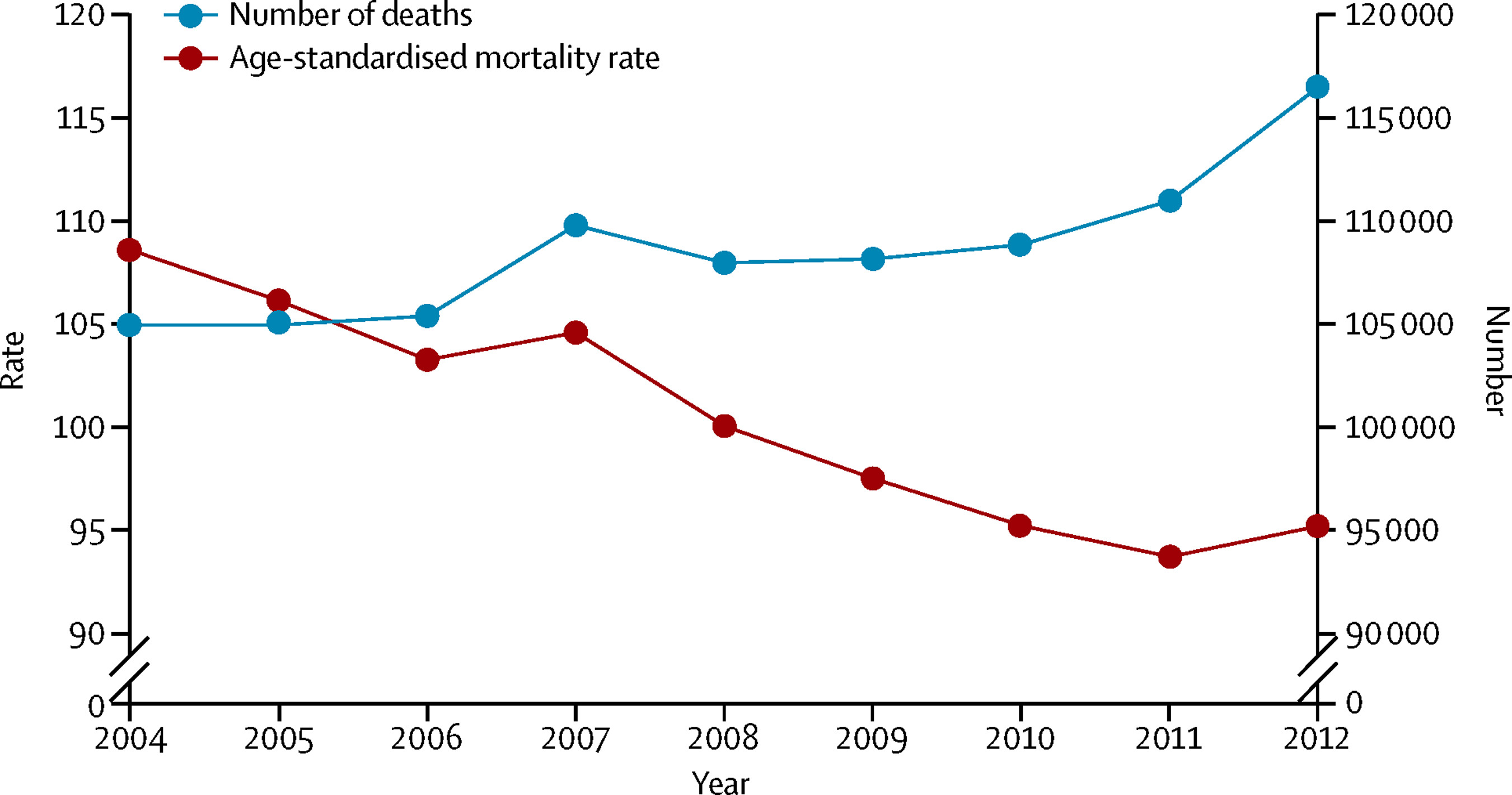The Impact Of Economic Crisis On Health - A Case Study Of Greece
Theimpact of the economic crisis on health in Greecehas been profound, extending beyond economic concerns to intricately affect public health, healthcare infrastructure, and the accessibility of essential healthcare services. This article explores the multifaceted ways in which the economic downturn has influenced these crucial aspects of the Greek healthcare landscape.
Economic Crisis And Health Disparities
The economic crisis gripping Greece has not only triggered financial turbulence but has also exacerbated existing health disparities, disproportionately affecting individuals across different socioeconomic status.
Income Inequality And Health Outcomes
The widening chasm in income levels, a conspicuous aftermath of the economic downturn, has emerged as a catalyst for profound health disparities. Individuals grappling with lower socioeconomic status find themselves thrust into an arena of heightened health risks. These risks extend beyond the immediate financial strain, encompassing limited access to quality healthcare, inadequate nutrition, and a dearth of essential mental health resources.
The disparities in healthcare access become glaring, as those with lower incomes often face barriers to seeking timely medical attention. Routine check-ups, preventive screenings, and necessary medical interventions become elusive, perpetuating a cycle of health challenges that tend to exacerbate over time.
Unemployment And Mental Health
One of the most palpable repercussions of the economic crisis is the surge in unemployment rates, creating a ripple effect on mental health. Job loss is not merely an economic setback; it's a profound disruption that infuses stress and uncertainty into the lives of many. This upheaval contributes significantly to the burgeoning rates of anxiety and depression, intricately weaving a mental health dimension into the broader impact of the economic crisis.
Individuals grappling with unemployment often face a double-edged sword. On one side is the immediate struggle for financial stability, and on the other lies the toll on mental well-being. The pervasive anxiety about the future, coupled with the loss of a professional identity, amplifies the mental health challenges faced by individuals and communities at large.
Healthcare Infrastructure Strain
The economic crisis in Greece has inflicted a considerable toll on the nation's healthcare infrastructure, unraveling a series of challenges that extend far beyond the fiscal domain.
Budget Cuts And Hospital Resources
A significant aftermath of the economic downturn is the pronounced strain on Greece's healthcare infrastructure. Budgetary constraints, characterized by extensive cuts, have led to a decrease in crucial resources for hospitals. This substantial reconfiguration of financial allocations has triggered a ripple effect within the healthcare sector, affecting the availability of vital medical equipment, the sufficiency of personnel, and the accessibility of indispensable supplies. For more information on healthcare challenges and solutions, you can explore the benefits of technologies like the Halo Hybrid Fractional Laser for skin.
Hospitals find themselves grappling with a stark reality—doing more with less. The diminished resources impede the ability to provide optimal care, affecting the quality and efficiency of healthcare delivery. Medical facilities, once equipped to meet the diverse needs of patients, now navigate a landscape where tough choices are made, and the equilibrium of healthcare provision is undeniably disrupted.
Impact On Primary Care Services
The economic downturn has not spared primary care services, further intensifying the strain on the healthcare system. As budget cuts reverberate through the corridors of healthcare institutions, primary care services bear the brunt of this fiscal pressure.
Preventive measures, the bedrock of sound public health practices, face unprecedented challenges. Routine check-ups, vaccinations, and health screenings—the linchpin of early disease detection—find themselves on shaky ground. The repercussions of these challenges extend beyond the immediate, potentially paving the way for delayed diagnoses and a subsequent surge in long-term healthcare costs.
The strain on primary care services is particularly worrisome as it undermines the foundational principles of public health. Timely interventions and preventative measures, cornerstones of a robust healthcare system, risk being compromised, posing a threat not only to individual well-being but also to the broader societal fabric.
Impact Of The Greek Economic Crisis On Society And Health
The Greek economic crisis, a tumultuous period from 2009 to 2019, left an indelible mark on Greek society, ushering in a cascade of adverse effects that reverberated through various facets of life. The repercussions were particularly profound on the health of the population, painting a stark picture of the intersection between economic upheaval and public well-being.
Economic Contraction - A 20% Blow To GDP
At the heart of the crisis lay a substantial contraction in the Gross Domestic Product (GDP), a key indicator of a nation's economic health. Over the course of the decade, from 2009 to 2019, Greece experienced a staggering 20% reduction in GDP. This contraction rippled through the economic landscape, impacting businesses, employment, and the overall financial stability of the nation.
Declining Health Expenditure - A 30% Erosion
Concurrently, the crisis dealt a severe blow to the healthcare sector, a vital component of societal resilience. Health expenditure, a crucial investment in the well-being of the population, witnessed a precipitous decline of 30%. This contraction in healthcare funding not only strained the capacity of medical institutions but also restricted access to essential services for those in need.
The confluence of economic contraction and dwindling health expenditure created a perfect storm, challenging the very foundations of a healthcare system meant to safeguard the health of the population.
Unemployment Surge - A 253% Increase
One of the most pronounced and palpable effects of the economic crisis was the unprecedented surge in unemployment. Over the tumultuous decade, the unemployment rate soared by a staggering 253%. This surge in joblessness wasn't merely a statistic; it was a profound disruption to the livelihoods of countless individuals and families.
Unemployment, beyond its economic implications, emerged as a potent source of stress and uncertainty, permeating the fabric of daily life. The mental health toll of job loss, coupled with the financial strain, contributed to a pervasive sense of anxiety and despair within the population.
The Cumulative Impact On Health And Well-being
The amalgamation of economic contraction, reduced health expenditure, and a surge in unemployment created a complex web of challenges for the Greek population. Access to healthcare became precarious, as financial constraints limited the ability of individuals to seek timely medical attention. The mental health dimension, intertwined with economic uncertainties, added an additional layer of complexity to the health crisis.
As the nation grappled with the fallout of the economic turmoil, the health statistics painted a sobering picture of the toll on the population. The period marked not just an economic downturn but a comprehensive health crisis, underscoring the intricate links between a nation's economic vitality and the well-being of its people.
Declining Satisfaction - The Erosion Of Confidence In The Greek Healthcare System
Over the course of nearly a decade, the satisfaction of Greek citizens with their healthcare system underwent a profound and disconcerting transformation. The stark numbers tell a tale of dwindling confidence, reflecting the challenges and strains that the Greek healthcare system faced.
From 52% In 2007 To 35% In 2015
In 2007, a majority—52%—of Greek citizens expressed satisfaction with their healthcare system. However, this satisfaction level experienced a precipitous decline over the subsequent years. By 2015, the proportion of satisfied citizens plummeted to a mere 35%. This drastic decrease signifies a noteworthy shift in public sentiment, indicating a growing discontent and disillusionment with the healthcare services provided.
International Benchmarks - The Lowest Value Among OECD Countries
Notably, the decline in satisfaction levels in Greece stands out starkly when compared on an international scale. Among the countries belonging to the Organisation for Economic Co-operation and Development(OECD), Greece recorded the lowest value for citizen satisfaction with its healthcare system in 2015.
This distinction as the least satisfied among OECD countries underscores the severity of the challenges faced by the Greek healthcare system. The reasons behind this decline are multifaceted, encompassing economic constraints, strains on healthcare infrastructure, and diminishing access to essential services.
Exploring The Causes - Unpacking The Factors Behind Dissatisfaction
Understanding the factors contributing to this decline in satisfaction is imperative for devising targeted interventions. Economic downturns, budget cuts, and a strained healthcare infrastructure likely played pivotal roles. The reduction in health expenditure, as witnessed during the economic crisis, directly impacted the quality and accessibility of healthcare services.
Long wait times, limited access to necessary medical interventions, and challenges in securing medications—all symptomatic of a healthcare system under duress—contributed to the growing discontent among Greek citizens. The erosion of trust in the healthcare system, once a pillar of societal well-being, demands a comprehensive examination of the systemic issues at play.
Path Forward - Rebuilding Trust And Resilience
Reversing this downward trend in satisfaction requires a concerted effort to address the root causes. A multifaceted approach that combines economic recovery, strategic investments in healthcare infrastructure, and initiatives to enhance the quality of healthcare delivery is essential.
Engaging the public in the reform process, promoting transparency, and cultivating open communication channels are pivotal strategies that can significantly contribute to rebuilding trust in the Greek healthcare system. This journey toward restoring satisfaction is not only a pragmatic necessity but also a crucial step in revitalizing the overall health and well-being of the Greek population. For more information on healthcare in Greece, you can explore Greeklish.net.
Government Initiatives And Responses
The government's role in responding to the economic crisis in Greecehas been pivotal, marked by a combination of austerity measures and health reforms. Understanding the dynamics of these initiatives sheds light on the delicate equilibrium policymakers have sought to maintain between fiscal responsibility and public health.
Austerity Measures And Health Reforms
In the face of economic adversity, governments implemented austerity measures as a means of fiscal consolidation. The healthcare sector was not immune to these measures, facing reductions in funding and resource allocation. Health reforms, crafted in response to the crisis, aimed to reshape the healthcare landscape, optimizing efficiency and resource utilization.
Analyzing the effectiveness and impact of these austerity measures and health reforms becomes imperative in comprehending the intricate dance between financial prudence and the well-being of the population. Questions regarding the accessibility of healthcare, the quality of services, and the overall resilience of the healthcare system come to the forefront, as policymakers grapple with the challenge of maintaining public health standards under constrained financial conditions.
Community Health Programs
Amidst the challenges posed by austerity measures, some beacons of hope emerged in the form of community-based health programs. These initiatives, born out of necessity and community resilience, have played a crucial role in addressing specific health needs at the grassroots level.
Despite financial constraints, communities have rallied to develop programs tailored to their unique health challenges. These community health programs serve as a testament to the resilience and adaptability of local populations in the face of adversity. By examining these initiatives, we gain valuable insights into the power of community-driven solutions in mitigating the health impact of the economic crisis.
The exploration of community health programs is not only an acknowledgment of the strength inherent in local communities but also a source of inspiration for crafting comprehensive and sustainable healthcare strategies. As these grassroots efforts continue to evolve, they offer valuable lessons for policymakers, demonstrating the potential for community-driven interventions to complement broader governmental initiatives.
Mental Health Stigma And Accessibility
The intersection of mental health stigma and accessibility presents a complex challenge exacerbated by the economic crisis, significantly impacting vulnerable populations and hindering the broader societal approach to mental well-being.
Stigma As A Barrier To Mental Health Services
The economic crisis has cast a long shadow over mental health, deepening the existing stigma that surrounds mental health issues. Societal judgments and misconceptions have been exacerbated, fostering an environment where individuals grappling with mental health concerns hesitate to seek the support they desperately need.
Stigma acts as a formidable barrier to mental health services, creating a culture of silence and secrecy. Many individuals, fearing discrimination or societal censure, choose to endure their mental health challenges in isolation rather than reaching out for professional help. This reluctance perpetuates a cycle where untreated mental health issues can escalate, resulting in more severe consequences for individuals and communities.
Addressing mental health stigma is not merely a matter of individual well-being; it is a societal imperative. Challenging stereotypes, fostering empathy, and promoting open dialogue are essential steps toward dismantling the barriers that stigma erects around mental health services.
Impact Of Economic Crisis On Health - FAQs
What Are The Effects Of The Greek Economic Crisis?
- Economic Contraction:The Greek economic crisis, primarily between 2009 and 2019, resulted in a significant contraction of the country's Gross Domestic Product (GDP). This economic downturn had far-reaching consequences, impacting businesses, employment, and overall financial stability.
- Unemployment Surge:One of the most pronounced effects was a substantial increase in unemployment rates, reaching unprecedented levels. The surge in joblessness not only had economic implications but also took a toll on mental health and societal well-being.
- Austerity Measures:To address financial challenges, Greece implemented austerity measures, leading to budget cuts in various sectors, including healthcare. These measures aimed at fiscal consolidation but had implications for the provision and accessibility of public services.
- Healthcare Strain:The economic crisis placed considerable strain on the healthcare system. Reductions in health expenditure, budget constraints, and resource limitations affected the quality and accessibility of healthcare services, impacting the overall health of the population.
- Social and Mental Health Impact:The crisis had profound social and mental health implications. Income inequality increased, leading to disparities in health outcomes. Mental health issues, stress, and anxiety became prevalent, affecting the overall well-being of the Greek population.
What Is The Problem With Healthcare In Greece?
- Budgetary Constraints:The economic challenges faced by Greece resulted in significant budgetary constraints, impacting the healthcare sector. Reduced funding and resource allocation affected the capacity of medical institutions, leading to challenges in providing optimal care.
- Infrastructure Strain:Budget cuts led to a strain on healthcare infrastructure. Hospitals faced limitations in essential resources such as medical equipment, personnel, and supplies, impacting the overall efficiency and quality of healthcare services.
- Primary Care Challenges:The economic downturn disproportionately affected primary care services. Routine check-ups, vaccinations, and health screenings faced challenges, potentially resulting in delayed diagnoses and increased long-term healthcare costs.
- Accessibility Issues:Financial constraints made it difficult for individuals to afford essential medications, and delayed medical care seeking became more prevalent. These issues contributed to barriers in accessing timely and necessary healthcare services.
How Was Greece Affected By The Great Depression?
- Economic Collapse:The Great Depression, which began in 1929, had severe consequences for the global economy, and Greece was not immune. The collapse of the international economy led to a significant decline in Greek exports and tourism, exacerbating economic woes.
- Agricultural Crisis:Greece, heavily dependent on agriculture, faced an agricultural crisis during the Great Depression. Falling agricultural prices and a decline in demand for Greek products contributed to economic hardships in rural areas.
- Political Turmoil:The economic challenges triggered political instability in Greece. The 1930s saw a series of coups and political upheavals as different factions vied for control, setting the stage for subsequent political developments.
- Social Struggles:The economic hardships resulted in widespread poverty, unemployment, and social struggles. The Greek population endured severe economic difficulties, contributing to social unrest and creating a challenging environment for individuals and families.
Conclusion
The economic crisis in Greece has cast a long shadow over the nation's health landscape. From widening health disparities to straining healthcare infrastructure and limiting access to essential services, the consequences are profound. As Greece strives to recover economically, understanding and addressing the health implications of the crisis will be integral to rebuilding a resilient and sustainable healthcare system.



